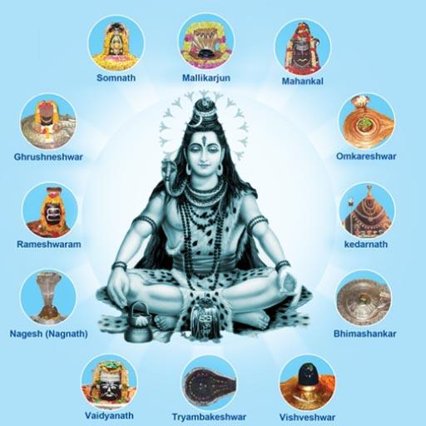Jyotirlingas of India

Jyotirlingas are the 12 special shrines dedicated to Shiva since ancient times. A Jyotirlinga or Jyotirling or Jyotirlingam is a shrine where Lord Shiva is worshipped in the form of a Jyotirlingam or Lingam of Light.
As per religious textbooks, Shiva Mahapuran, once Lord Brahma and Vishnu went to war in to prove their supremacy over the one other. To sort this issue, Shiva formed a huge pillar of light asked the two to find the end of the light. Brahma chose to go upwards in the direction of light and Vishnu chose to go down. Much later, both appeared in front of Shiva and Vishnu accepted his defeat, but Brahma chose to lie and said he found the end of light. This angered Shiva and he cursed Brahma that no one will ever pray to him ever. This pillar later came to be known as Jyotirlinga.
It is said that there are 64 Jyotirlingas across India, however 12 of these are of utmost importance as mentioned below.
- Omkareshwar in Khandwa, Madhya Pradesh

Omkareshwar temple in Khandwa is one of the most revered places in India dedicated to Lord Shiva. Set on an island named Mandhata or Shivapuri by the Narmada River, the shape of the lingam here looks like ‘Om’. The place features two main Shiva Temples, one is Omkareshwar and the other is Amareshwar.
- Somnath Temple, Gujarat

Located in Veraval, Somnath Temple is considered one of the most famous and revered Shiva shrines in the world as it is believed to be the first among the 12 jyotirlinga. It is said that once moon lost it shine and lustre because of a curse. To get rid of the curse, the moon god bathed here and got the lustre back. Since then, it is called Somnath, meaning the ‘lord of the moon’.
- Mallikarjuna in Srisailam, Andhra Pradesh

Sri Bhramaramba Mallikarjuna Temple in Srisailam is named after Mallikarjuna Swamy. Legend has it that Shiva and Parvati came here to meet their angry elder son Kartikeya because his younger brother Ganesha was getting married before him. The mammoth fort like temple features Mallikarjuna Swamy and Bharmaramba Devi are its main deities.
- Mahakaleswar in Ujjain, Madhya Pradesh

Mahakaleshwar in Ujjain is set on the banks of Rudra Sagar lake, the lingam here is considered to be deriving its powers from Shakti within. The temple features more than a hundred little shrines within the temple complex.
- Rameshwaram Jyotirlinga, Tamil Nadu

It’s located in the southernmost of all the 12 Jyotirlingas, in the island of Rameshwaram, Tamil Nadu. It is known for its architecture. This particular Jyotirlinga is closely associated with Lord Ram’s victorious return from Sri Lanka. As per legends, while Lord Ram was on his way to Sri Lanka, he took a halt at Rameshwaram and was drinking water on the seashore. Just then, there was a celestial edict, which stated “You are drinking water without worshipping me.” Hearing this, Lord Ram made a linga of sand, worshipped it and sought blessings to defeat Ravana. Lord Shiva gave him his blessings and then turned into a Jyotirlinga, which is now known as Rameshwaram Jyotirlinga.
- Kedarnath in Rudraprayag, Uttarakhand

Kedarnath in Rudraprayag is one of the main Shiva temples and is considered quite idolised. It is also a prime Chardham Yatra destination and remains close for six months due to extreme weather conditions.
- Bhimashankar in Maharashtra

Bhimashankar in Maharashtra is around 100 km from Pune, situated on the hills of Sahyadri Range. The temple here enjoys gorgeous location and is a trekker’s paradise. This is also the place from where one of largest tributaries of Krishna River originates, called the Bhima River. Here you can also see Buddha style carvings of Amba-Ambika in the surroundings.
- Vishwanath in Varanasi, Uttar Pradesh

Situated on the banks of the holy river Ganga, Vishwanath Temple is one of the twelve Jyotirlingas, which is considered the holiest. Vishveshvara, meaning Ruler of The Universe, the temple finds its mention in ancient Hindu scriptures.
- Trimbakeshwar in Nashik, Maharashtra

It is located on the banks of river Godavari and is one of the ancient Hindu temples dedicated to Lord Shiva. Nashik is also one of the four cities where holy Kumbha takes place every 12 years. There is also a Kusavarta, a holy kunda (sacred pond) inside the temple whose source of water is the Godavari River, which is also famous for being the longest river in peninsular India.
- Ghrishneshwar Jyotirlinga, Aurangabad

Ghrishneshwar Jyotirlinga is near the famous tourist hotspot- Ajanta and Ellora caves. Legend has it that there once lived a very religious woman, named kusuma, who was a firm believer of Lord Shiva. She used to immerse Shiva’s lingam in a tank daily as part of her daily prayer. However, her husband’s second wife got jealous of her devotion and respect in the society. And in a fit of rage, she killed Kusuma’s son. Kusuma was heartbroken and depressed, yet she continued worshipped Lord Shiva. It is believed that when she immersed the lingan into the tank, i.e., after her son’s death, he became alive miraculously again. It is also believed that Shiva appeared before Kusuma and the villages at that time. And on Kusuma’s request, Shiva manifested Himself at that very site, in the form of Ghrishneshwar Jyotirlinga.
- Vaidyanath or Baijnath in Deogarh, Jharkhand

Now this is a very disputed jyotirlinga temple in India considering there are three destinations in the country whose natives claim that the jyotirlinga is there. These are Vaidyanath in Deogarh, Jharkhand, Baijnath in Himachal Pradesh and Parli Vaijnath in Maharashtra. Also known as Baba Dham, devotees from all over come here to pour jal over Shivalinga here during the Hindu month of saawan every year.
- Nageshvara in Dwarka, Gujarat

This temple has its ‘mention’ in ‘Shiva Purana’. It is mentioned in the text that Shiva in Nageshwar form (body full of serpants) once defeated a demon called ‘Daruka’ and his army to rescue one of his ardent devotees named Supriya. Since then, it is called the Nageshwar Temple.















































